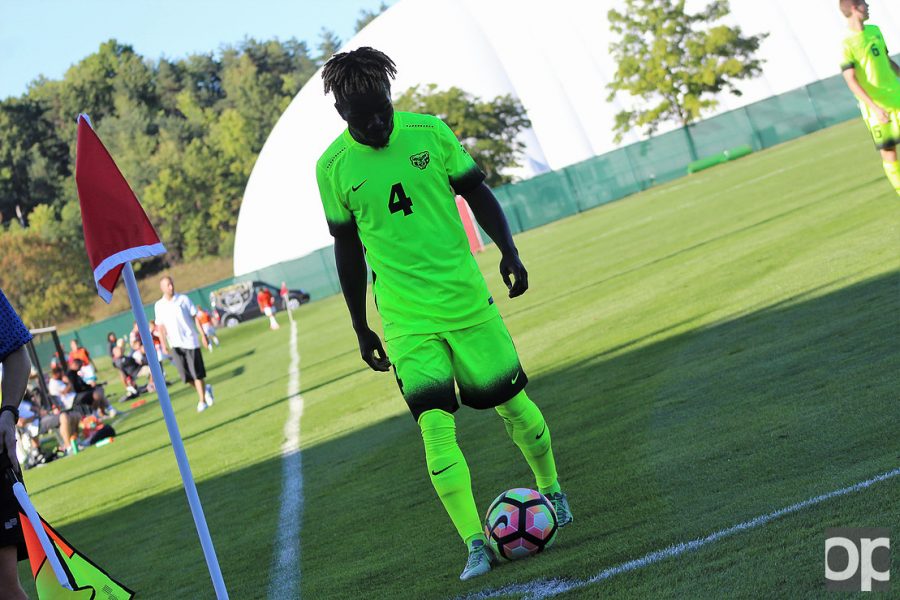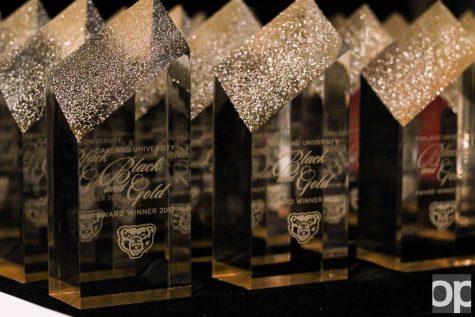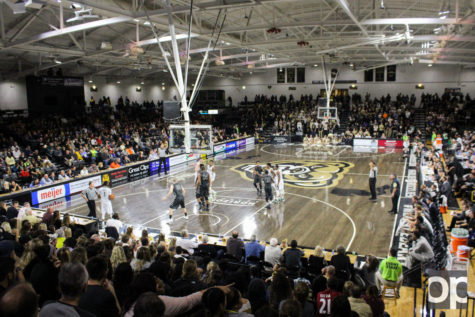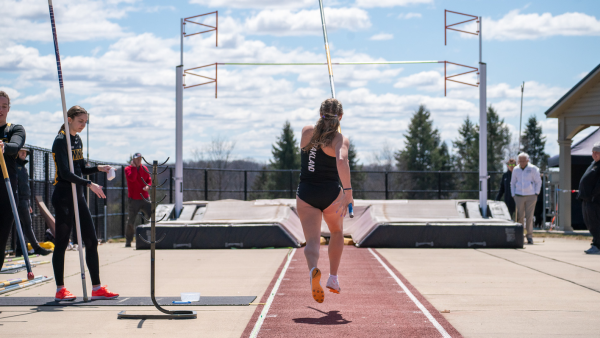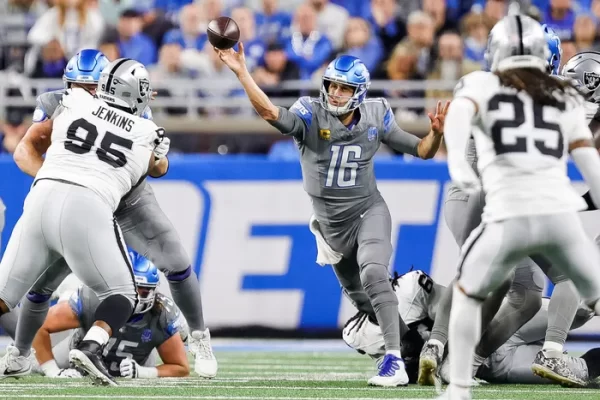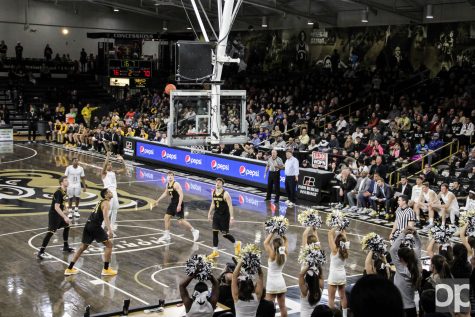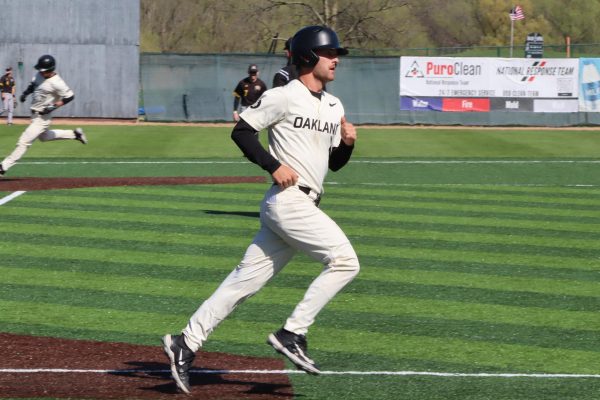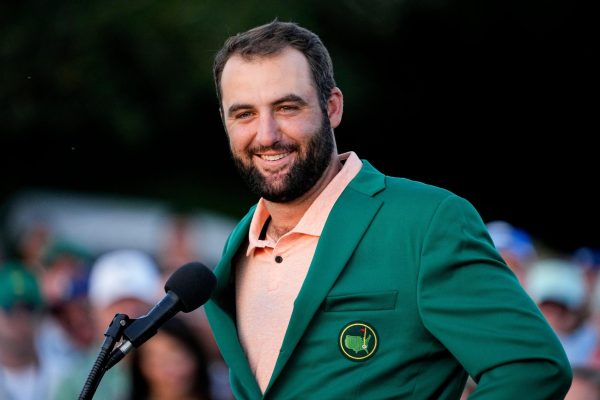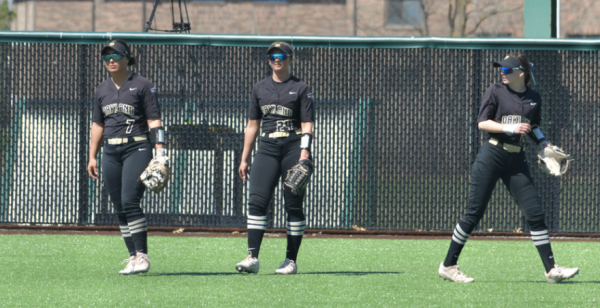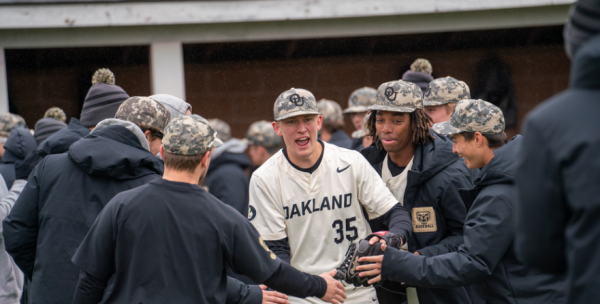Mr. Versatile has arrived
Watch any Oakland men’s soccer game and you’ll see him up the left side. He’s a junior, listed as a defender, but watch out for him near the goal. Wilfred Williams is ubiquitous.
It’s his first year at Oakland, and he arrived by way of the FC Dallas academy, the Charlotte Eagles, the US Youth Soccer Olympic Development Program, the Youth National Team program, Johnson City, Tennessee, Philadelphia, Liberia and a refugee camp in Ghana. He moved to the U.S. when he was 10.
Oakland head coach Eric Pogue first heard of Williams in fall 2015 from senior defender Keenan King, a transfer from Eastern Florida State College, which Pogue said is one of the top junior college soccer programs in the country. Oakland associate head coach Stephen Gorton knew Oliver Twelvetrees, Eastern Florida’s head coach. Pogue started watching game film.
“We were looking for a left-sided player to possibly push Keenan farther up the field,” Pogue said. “We knew Wilfred had the versatility to play left-back, also play left wing, possibly even play center-back.”
Never underestimate the power of a reference.
“One of the biggest things for me was when Oliver told me that [Williams] basically walked into a team…and was basically elected team captain right when he got there,” Pogue said.
Williams came on an official visit in January 2016 and spent a lot of time with Pogue. Afterwards, Pogue was sure he needed Williams’ experience on his young team.
In the tough non-conference schedule, Williams was held back a bit in a more classic left-back role. Now, in conference play, Pogue said he’s blossoming into the more attacking role he’s capable of.
“Every time you do that, something good happens,” Pogue tells when he gets up to the attacking third of the field. “Whether he crosses it, whether he shoots it, we’re getting a good quality chance on goal, we’re getting a corner kick… ”
In the past couple of weeks, it clicked.
“What do they call you, ‘Wheels’?” Pogue said. “When I used to watch the games for Eastern Florida online, the commentator always used to call him Wheels. Wheels Williams.”
He’s been reprising the role.
Austin Ricci, a junior forward, is Williams’ roommate. He supports AC Milan, while Williams supports Arsenal, which means it’s a fairly harmonious relationship.
“It’s nice, you know,” Ricci said. “Besides the fact that I’m cooking all the time and doing all the dishes.”
He said Williams is picky with his food, but also said that when Williams is dribbling, he’s a steady presence.
“He’ll win the ball,” Ricci said. “Something will come of it when he gets forward.”
But Williams is not only confident with the ball.
“I think he is a person who knows what he wants to get from all this,” Ricci said. “He knows that he wants to eventually play somewhere. He’s genuinely a nice person at heart. Probably one of the nicer people I’ve ever met.”
Williams hadn’t even told Ricci of his professional aspirations. Ricci just knew. He could tell by how Williams conducted himself through his days. He was right.
Williams was part of U.S. Soccer’s U-14 National Development Program and U-15 Boys’ National Team, but didn’t go further because he didn’t have his citizenship. He’s working on his citizenship now, so he can fully run with any opportunity.
College wasn’t always a goal for Williams. Growing up, he wasn’t aware he could get an education for playing soccer.
But college recruiters came to him in high school. It’s been a good fit, though he sometimes questions his decision around exam week.
Williams remembers when he was a kid in Ghana.
“You wake up, you just go in the street, you play the game,” he said. “The only time you’re coming home is when you’re hungry. You come home, you eat, and you go right back out.”
Soccer balls were cherished, were fodder for theft. If you didn’t have an official version, you could make a serviceable one out of plastic.
“When there’s a game on, pretty much the whole town, the whole place will just shut down,” Williams said. “Everybody will surround a TV that’s outside.”
Soccer video games provoked a similar reaction.
There, people played FIFA at a PlayStation shop, not at home. Others gathered around and watched as if it were a live broadcast.
For Williams to someday be featured in one of those games would mean something to his family. He moved from Ghana 10 years ago and didn’t see his mother until 2014, eight years later.
“I never want to see my mom working again,” he said. “I want her to enjoy life…I want her to come to this country. You’d pretty much say that’s her retirement, where she can just do whatever that makes her happy and not have to worry about when her next bill is.”
Williams recalled George Weah, a player from his native Liberia who was prominent in the 1990s and is considered one of the greatest African soccer players of all time. He played in Europe and gave the kids hope that maybe they could do the same, Williams said. When Williams got the chance to come to the U.S., he took it.
“I had the opportunity to play with a lot of great players, a lot of great teams, had a lot of great coaches and mentors that have helped me not just become a soccer player, but just become a better human being,” Williams said.
Africa is where his love for the game started, but it was reinforced here.
“A lot of people say ‘I don’t have love for the sport anymore,’” Williams said. “They grow away from the sport.”
That never happened to Williams. There’s always something new to love, he said. He still plays like that kid a decade ago.


